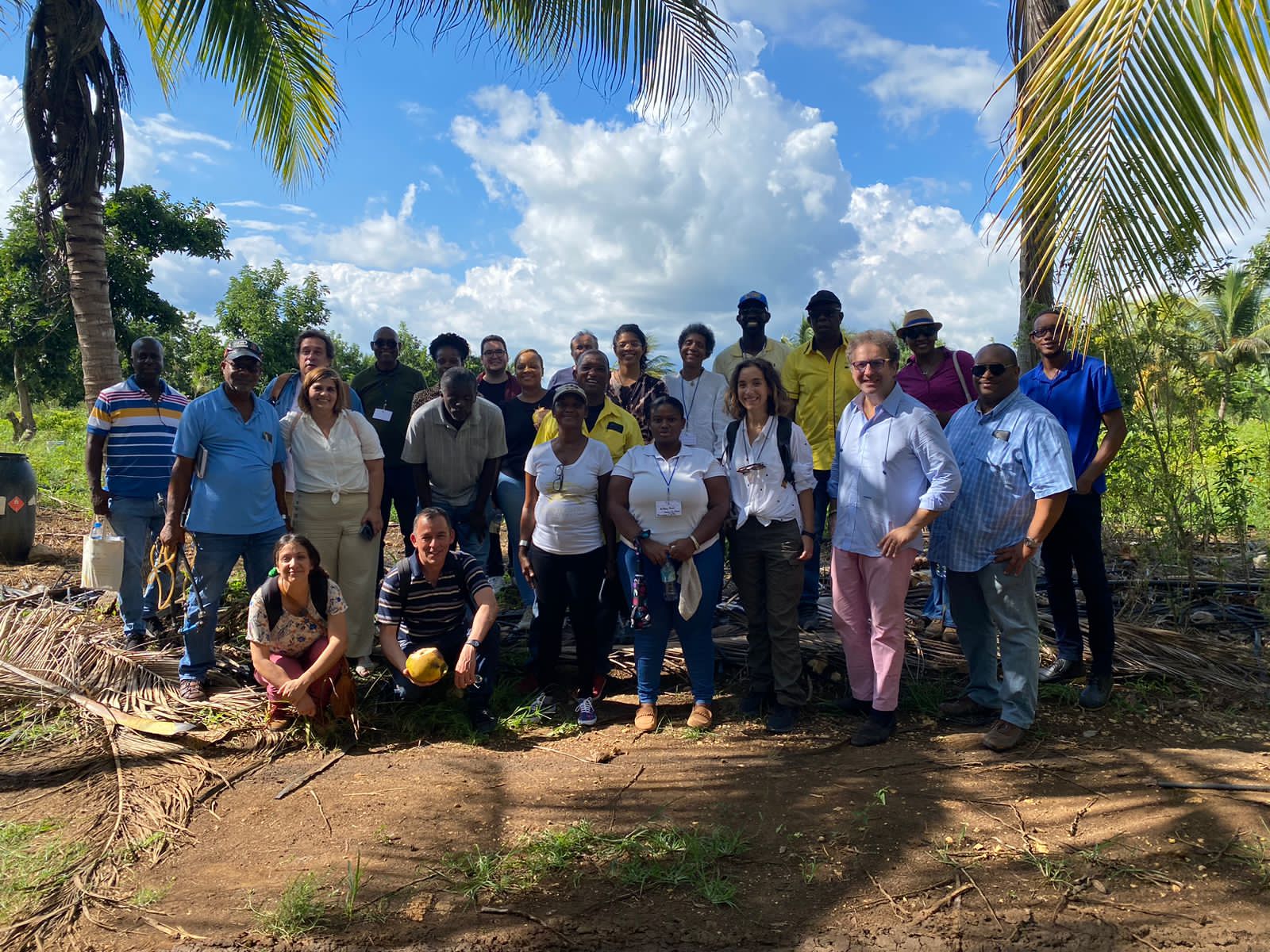FO4ACP National Learning Route in Jamaica facilitate exchange of experiences between local farmers’ organizations to develop innovative solutions for their participation in value-chains
As part of the Farmers Organizations for African, Caribbean and Pacific (FO4ACP) project, FAO, IFAD and PROCASUR, organized the 1st National Learning Route aimed to share knowledge with successful business experiences managed by small farmer associations within Jamaica

Day3 of the Learning Route: the participants went to Clarendon Region to learn about the Ebony Park Agro Cooperative Society.
©FAO
As part of the Farmers Organizations for African, Caribbean and Pacific (FO4ACP) project, FAO, IFAD and PROCASUR, organized the 1st National Learning Route aimed to share knowledge with successful business experiences managed by small farmer associations within Jamaica that can contribute to the identification of practical solutions to improve production, processing, marketing, associativity and business management processes among project beneficiaries.
The Learning Route had as its main theme "Moving up the value chain! Moving the business and associative capacities of small rural producers' organizations", and was held from October 25 to 29, 2022 with 14 representatives from 7 Farmers’ Organizations. Participating farmers' organizations included the New Era Farmers' Benevolent Society, the Banana River Farmers' Cooperative Society, Jamaica Egg Farmers Association, Jamaica Network of Rural Women Producers, Jamaica Cocoa Producers Association.
During the activity, tthe selected successful experiences/host cases could share their good practices and results with the participants, focusing on strengthen their knowledge in areas such as market access, governance and management systems, and associativity.
The host caseswere Jamaica Coffee Growers Association (JCGA), Jamaica Fisherman Co-operative Union (JFCU), Ebony Park Agro Co-operative Union (EPAC), Potato and Onion Producers Association (POPA), and the Jamaican Coffee Growers Association (JCGA).
Selvine Stephenson, FO4ACP national coordinator in Jamaica, highlighted part of the activities that began on Tuesday, October 25 and concluded on Friday, October 28.
"During the week, several activities were carried out, including field visits to experiences/success stories technical areas of operations: Jamaica Blue Mountains, Ebony Park Agro Park, Jamaica Fisherman Co-operative Union Limited headquarters and Discovery Bay Marine Protected Area. Knowledge and best practice exchanges with rural champions. Analysis and discussion workshops, technical support in the development of innovation plans, case analysis workshops that allowed the Farmers' Organizations to identify lessons learned from each experience and possible good practices that can be replicated."
When asked about the most important results and agreements reached during the learning path, Stephenson stated that the first of these were "Good practices, lessons and recommendations that are useful and replicable to promote sustainable processes of associative and business development, for better and greater participation in traditional and/or promising value chains".
"The realization that Farmers' Organizations should take advantage of the strategic potential presented by rural women and youth in associative and entrepreneurial development, either by mobilizing and integrating their skills and talents in existing entrepreneurial initiatives and/or by promoting the creation of new initiatives. Useful solutions that improve associative and entrepreneurial performance, mobilizing human and financial resources to enable their implementation. Development of Innovation Plans for all FOs - Participants will draft the plan they wish to develop to adopt a best practice that will enable them to improve their associative or entrepreneurial capacities. The Innovation Plan should support farmer or fisher organizations to strengthen their associative and entrepreneurial capacities, between the implementation and adoption of innovative mechanisms and tools learned during the route Stephenson emphasized.
Next steps to be developed for the FO4ACP project in Jamaica
Selvine Stephenson explained that after the Learning Route, each participant will have the support of rural talents for the activities of returning the Innovation Plan to their organizations of origin, contributing to the analysis and validation of the foundations, objectives and activities to be carried out, based on the lessons learned during the Route.
"It is an incentive to support the implementation of innovations in the producer organizations participating in each Route. It aims to support the development of innovation capabilities within each organization, as a factor contributing to better business performance and efficiency and to provide resources to the organizations for the implementation of the Innovation Plans," he said.
Farmers' organizations will also benefit from capacity building initiatives designed and delivered with the support of partner agencies in Jamaica. These trainings are expected to help alleviate some of the effects of the challenges identified and promote the success and sustainability of Jamaica's smallholder farmers.
The project is working closely with local partner organizations, such as the University of the West Indies (UWI) and the Rural Agricultural Development Authority (RADA), which will conduct training and mentoring/coaching services to six farmer organizations.
Policy dialogue
Jamaica has been called upon to support the implementation of the United Nations Decade of Family Farming (UNDFF) and to establish a National Dialogue Committee as part of a broader global consultation process to strengthen family farming.
The FO4ACP project will facilitate these policy dialogues that will ultimately lead to the creation of a National Dialogue Committee that will be responsible for developing a National Action Plan (NAP). These policy dialogues will become a platform for dialogue between public authorities, representatives of farmers' organizations, FAO, IFAD and other partners.
Contact
José Negrón Valera Communications specialist [email protected]
